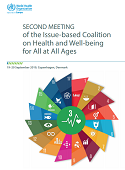Second meeting of the Issue-based Coalition on Health and Well-being for All at All Ages (19–20 September 2019)

Download
The second meeting of the Issue-based Coalition on Health and Well-being for All at All Ages (IBCHealth) was held at the WHO Regional Office for Europe in Copenhagen on 19–20 September 2019.
The purpose of the meeting was to discuss:
- IBC-Health’s work plan progress and achievements in 2019;
- IBC-Health’s work plan, joint products and priorities for 2020–2022;
- updates on IBC-Health’s engagement with other Issue-based Coalitions (IBCs) and partners;
- how IBC-Health can improve communication;
- a health guidance note and checklist to support the United Nations Sustainable Development Cooperation Framework (UNSDCF);
- the forthcoming guide to resources to implement the health-related Sustainable Development Goals (SDGs) in European Member States, prepared by WHO;
- SDG financing; and
- decisions on a lead agency and leaders for each workstream.
The agencies participating in the second meeting included the International Organization for Migration (IOM), United Nations Children’s Fund (UNICEF), United Nations Development Programme (UNDP), United Nations Environment, United Nations Population Fund (UNFPA) and the World Food Programme.
Meeting participants discussed the Coalition’s progress since its 2018 planning meeting and revised its terms of reference. Participants agreed to proceed with the previous workstream on coordination and the four technical workstreams (health over the life-course; communicable disease; universal health coverage, with a focus on medicines; and migration) and also to add two technical workstreams in the areas of primary health care and noncommunicable disease (NCD).
It was also agreed that each workstream should have one overarching outcome and no more than three supporting activities and that gender should be a cross-cutting theme throughout the workstreams. The revised terms of reference and draft work plan for 2020–2022 will be made available for further discussion and input at the next Regional United Nations System Meeting scheduled for November 2019.



